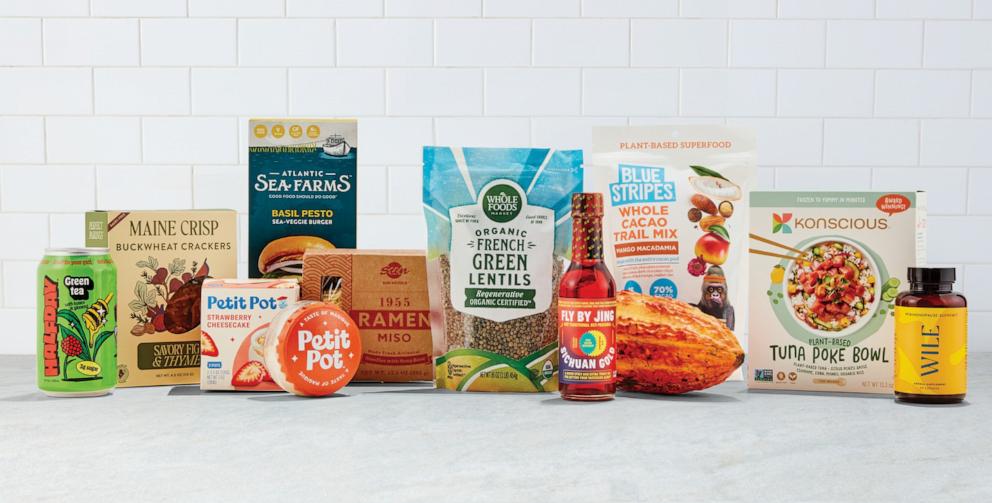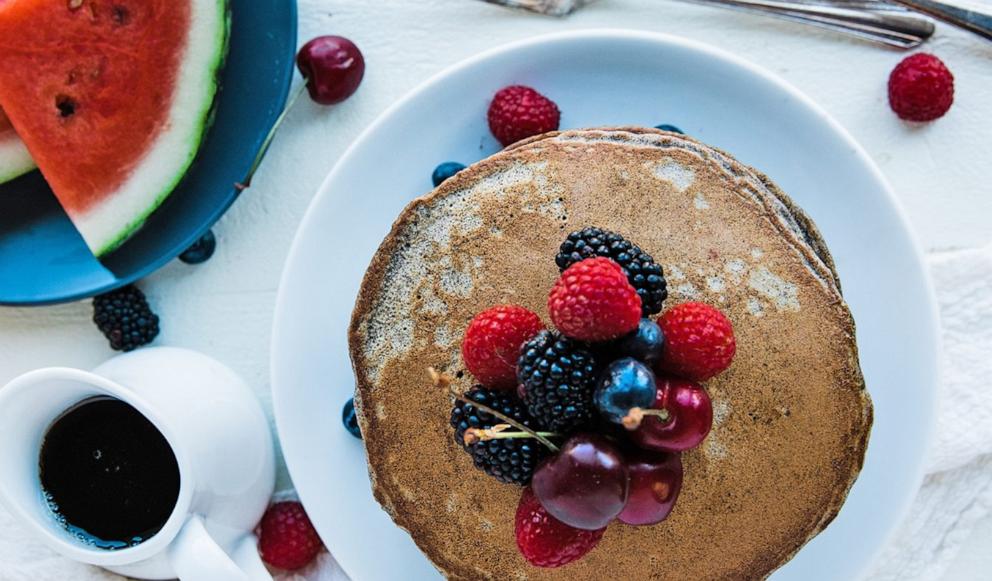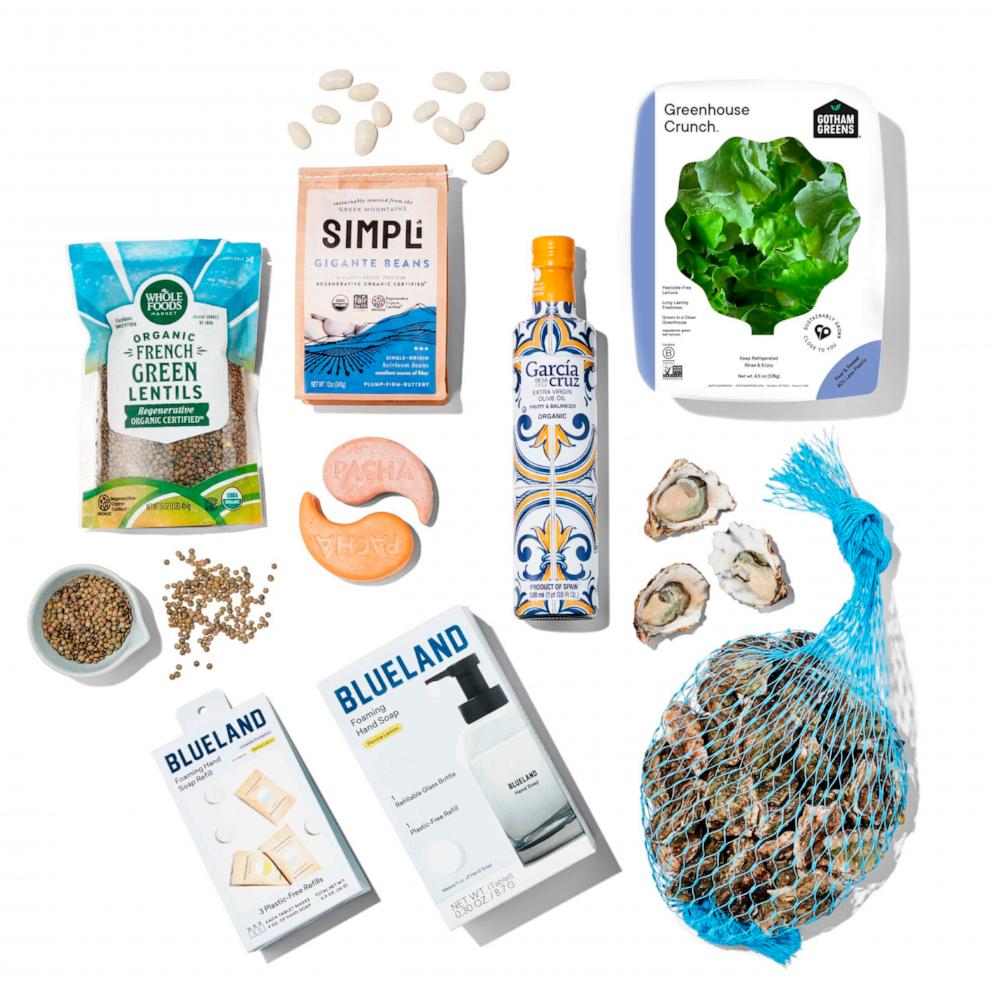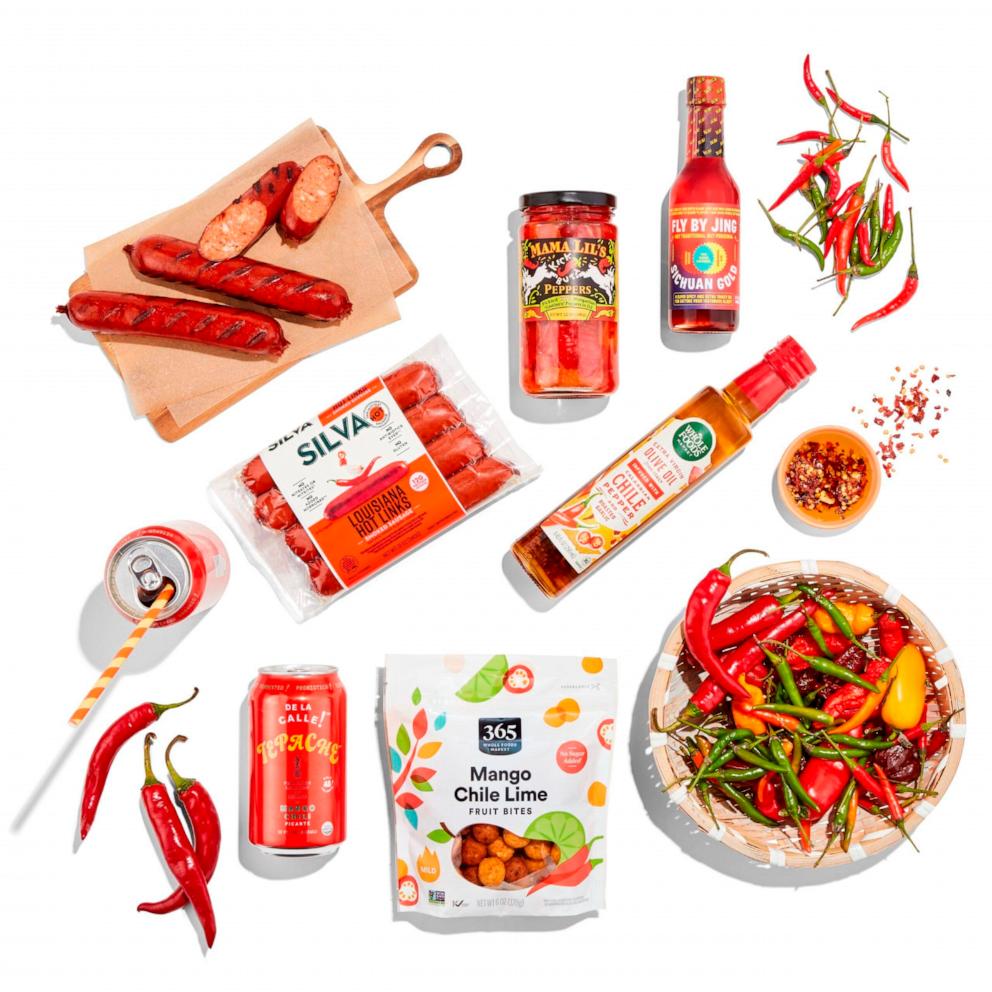As 2023 comes to a close, experts have reviewed what culinary consumers loved and latched onto to help predict what food trends may be in store for 2024.
Companies with insights into consumer habits from Whole Foods Market to Pinterest have published forecasts for the year ahead, and rather than just recite them, “Good Morning America” enlisted a few key players in the industry to share a taste of what they see standing out from the selections, and how to try those trends now.
A team of product experts from global buyers to local foragers who make up the trends council for Whole Foods compiled their annual list of predictions, including specific products, flavor trends and industry-wide movements that could gain momentum in the year ahead.
Top food trend predictions for 2024

A lineup of products that Whole Foods Market predicts will be top-sellers in 2024.
Whole Foods Market
Whether you’re the type of eater who craves transparent sourcing and environmentally conscious ingredients, or are in search of nutrient-dense foods to add into your recipe repertoire, there’s something for everyone to take a bite out of before the new year hits.
1. More plants in plant-based foods
The plant-based category, including milk alternatives, has brands and recipe developers alike opting for a purist approach — that is, using minimal ingredients with less additives that consumers can’t pronounce.
Rather than complex meat alternatives, the market is seeing a shift towards foods that opt for real, whole vegetables and protein-forward products made with mushrooms, walnuts, tempeh and legumes, to name a few.
Jason Bronstad, CEO of MALK Organics — an additive-free plant based milk alternative used by popular health food store Erewhon in its viral smoothie recipes — told “GMA” that “in general, people used to believe that any plant-based product was good for them.”
Bronstad said he’s been honing in on providing education for shoppers to understand a products’ full ingredient deck instead.
“We’ve proven that consumers are not looking for more than just vague claims of healthy,” he said of his company’s growth in the category. “They are asking more questions about the way they choose to nourish their bodies. The options for consumers to expand their food choices is both exciting and confusing, and to that point, entrepreneurs need to be very clear about why their brand exists and stay true to that path.”
How to try the trend
While there are plenty of new products to choose from at the grocery store, here’s how cookbook author and KaleJunkie creator Nicole Keshishian Modic suggests trying the trend at home.
One Pot Curry Lentil Soup

A bowl of lentil curry with coconut milk.
Gayle McLeod
This dish is packed with whole vegetables, coconut milk for creaminess and the star legume that’s rich in protein and nutrient-dense.
Ingredients
For the soup:
2 tablespoons extra virgin olive oil
1 medium onion, finely diced
3 cloves garlic, mashed
2 teaspoons ground ginger
1 tablespoon curry powder
1/2 teaspoon crushed red pepper flakes
1 cup red lentils
14.5-ounce can crushed tomatoes
3/4 cup cilantro, chopped
2 cups vegetable broth
1 cup full-fat coconut milk
For garnishing:
1/4 cup chopped cilantro
1 dollop Greek yogurt or coconut milk
1 drizzle extra virgin olive oil
1 pinch flaky sea salt
1 pinch ground black pepper
Directions
To make this soup, start by heating a large pot on the stove over medium heat. Add in the olive oil and allow it to heat up.
Next, chop the onions and add them to the pot, allowing them to cook for 7-8 minutes until the onions begin to soften and brown slightly.
Once the onions have softened, add in the garlic, ginger, curry powder and crushed red pepper flakes.
Stir the onions and spices together for about a minute, until they’re fully combined. Then, add in the lentils, crushed tomatoes, cilantro, vegetable broth and coconut milk.
Stir the ingredients together until they’re combined, then reduce the heat to low and place a cover on the pot.
Allow the soup to cook for 20-25 minutes, until the lentils are tender and cooked through, but not mushy.
Once the soup is done, remove it from the heat and divide it among four bowls. Top with garnishes of choice, then serve and enjoy!
Recipe reprinted with permission courtesy of KaleJunkie.
2. Buckwheat breakthrough
Despite its name, the cover crop known to support soil health is not actually related to wheat. It’s a relative of rhubarb and a naturally gluten-free superfood seed filled with protein, carbs and fiber.
With options hitting shelves like soba noodles, crackers, granola and flour, buckwheat is on its way to a breakthrough year in the U.S.
“Buckwheat is a versatile and delicious whole grain that cooks up in just 10 to 15 minutes. Its nutty flavor blends well with all kinds of cuisines, making it ideal for grain bowls, salads, soups, granola, hot cereal and more,” chef Sarah House, who leads food innovation for research and development at Bob’s Red Mill, told “GMA.”
Plus, she said, “With 6 grams of protein per serving, it’s a convenient way to supercharge your diet.”

A plate of buckwheat pancakes with fresh fruit.
Bob’s Red Mill
House added that the “whole kernels can also be ground into flour, which is popular in pancakes in the U.S.”
The mainstay ingredient in Asian and Eastern European cuisines “can be toasted to intensify its flavor and it’s an essential ingredient for kasha varnishkes and knishes,” she noted.
How to try the trend
5 Ingredient Buckwheat Protein Pancakes
Ingredients
3 cups Bob’s Red Mill Buckwheat Pancake Mix
3 scoops vanilla protein powder
3 tablespoons melted butter or canola oil + 1 tablespoon cold butter
3 eggs
2 1/4 cups whole milk
Assorted berries and maple syrup toppings
Directions
In a large bowl, mix together the pancake mix, protein powder, 3 tablespoons of melted butter, eggs and milk until completely combined.
Next, place the cold butter in a large frying pan over medium-low heat and once it is melted add about a 1/2 cup of the pancake batter into the pan.
Cook for 2 to 3 minutes per side or until golden brown on each side and cooked throughout.
Add toppings and serve.
Recipe reprinted with permission courtesy of Bob’s Red Mill Natural Foods.
3. Shopping for environmental impact: Conscious food production
Growing interest in regenerative agriculture — which starts with farming practices that restore soil, improve biodiversity and ultimately can help conserve water — has brands boasting clean practices like Regenerative Organic Certification on labels, and consumers shifting towards products with both nutritious health benefits and long-term environmental benefits.
Diego Norris, chief marketing officer of Gimme Seaweed, hailed the sea vegetables as “the ultimate regenerative crop” that, along with shellfish, “is one of the few farmed foods with a net positive environmental impact.”
“Seaweed requires no fresh water to grow, and if farmed organically without the use of pesticides and chemicals, as Gimme does, it can help to keep our oceans clean and fight climate change,” he told “GMA.”
The first and now leading organic seaweed snack in the U.S. uses its organic farms to sequester carbon and improve water quality. One ton of seaweed can sequester over 1 ton of carbon dioxide per year.
“As awareness continues to rise around climate change, interest in sustainable farming practices and usage of coastal and marine resources has increased,” Norris said, adding that since 2018, the seaweed category has grown by more than 63%.

Eco-conscious products from Whole Foods Market.
Whole Foods Market
Other brands at the forefront of this forward-thinking trend, Norris said, include Barnana, which has pioneered the practice of utilizing imperfect or overripe bananas to create nutritious snacks,” which helps mitigate food waste and underscores a commitment to sustainability.
Similarly, he said, “Moonshot Snacks, now under the Patagonia Provisions label, exemplifies another trailblazer in climate-friendly food production. From conscientious sourcing and eco-friendly packaging to their overall manufacturing process, they embody a holistic approach to environmental stewardship.”
Beyond seaweed, Norris suggested shoppers keep an eye out for other ingredients that have a significant impact in sustainable agriculture.
“Legumes like chickpeas and lentils, and ancient grains such as sorghum, quinoa and amaranth,” he suggested. “Legumes, in particular, are lauded for their ability to enrich soil with nitrogen, thereby enhancing soil health. They also offer a rich source of protein, making them an ideal ingredient for nutritious snacks. Ancient grains are valued for their low water requirements and adaptability to grow in less-than-ideal farming conditions, making them a sustainable choice for future food production.”
How to try the trend
To see which style of legumes you want to incorporate more of next year, check out this recipe from Daphne Oz that uses both green lentils and black beans for burgers; Antoni Porowski’s bean, chickpea and quinoa chili recipe; or One Great Vegan’s lentil vegan meatballs.
4. Next level instant noodles
For years, home cooks who enjoyed a semi-homemade approach have shared inventive ways to amp up the flavors of store-bought instant noodles. Now, brands like Omsom are elevating options with gourmet flavors that rival classics and leave out unwanted preservatives, adding ease and comfort to a warm bowl with high-quality ingredients.
As Omsom continues to expand into more spaces, co-founder Kim Pham told “GMA” her team is continuing on the company’s “day one mission of being a brand that reclaims and celebrates the multitudes that exist in Asian American flavors and stories.”
“I think we’re seeing an emergence of ‘high-low’ — taking ultra-convenient formats that were previously looked down upon or perceived as low-quality, like instant noodles or pre-made sauces, and revamping them,” Pham said.
“There’s an element of re-imagining and reclaiming nostalgic, childhood faves here that really resonates with modern consumers,” she added. “When we launched Omsom’s Saucy Noodles earlier this year, our goal was to break free from the notion that instant noodles are cheaper or lackluster, with bold, rustic sauces and thick and bouncy air-dried, knife-shaved noodles.”
How to try the trend
“I honestly love taking the high-low concept to the max. Sometimes I’ll top our Saucy Noodles or boxed mac ‘n cheese with a beautiful seared, medium-rare rib eye from the butcher,” Pham said. “It’s decadence to the max and sometimes exactly what I need after a long weekday.”
As Pham suggests, incorporating gourmet store-bought packs of noodles or sauces can be a fast, easy and frugal way to transform and elevate a single star ingredient like steak or seafood.
5. Little luxuries
Little treats and reward culture has been all over social media and the trends council forecasts, it’s here to stay.
Whether it’s an impulse cookie buy or a mood-boosting beverage, brands have already started to get on board to adjust cost and format to fit individual serving packages that add joy without breaking a budget.
How to try the trend
FeelGoodFoodie creator Yumna Jawad has the ultimate “little luxury” that you can make ahead in a big batch and store away for that post-commute treat or another spontaneous moment of indulgence. Plus, unlike some packaged treats, this one has just four good-for-you ingredients.
Date Snickers Recipe
Ingredients
12 medjool dates
1/4 cup peanut butter divided
1/4 cup chopped roasted peanuts divided4 ounces dark chocolate bar cut into chunks
Directions
Use a small sharp knife to cut a slit in each date lengthwise. Remove the pits.
Fill each date with 1 teaspoon peanut butter and add 1 teaspoon of crushed peanuts on top. Set aside.
Place the chocolate in a microwave-safe bowl. Place the bowl in the microwave at 30 second intervals. Stir the chocolate in between each 30 seconds until all the chocolate is melted.
Place a toothpick inside each stuffed date and dip the date in the melted chocolate. Use a spoon to coat the date completely in the chocolate, then allow any excess chocolate to drip off.
Transfer the chocolate covered date to a tray or plate lined with parchment. Sprinkle the top with the remaining crushed peanuts.
Place the dates in the fridge to allow the chocolate to set, about 10 minutes.
Recipe reprinted with permission courtesy of FeelGoodFoodie.
6. Complex heat

A lineup of spicy pepper products from Whole Foods Market.
Whole Foods Market
The trends council said it has seen an “evolution with global peppers taking off in every aisle,” with expectations that the trend will only grow hotter.
Even Ed Sheeran dipped into the spicy condiment game this year with Tingly Ted’s, his first hot sauce collaboration with Kraft Heinz.
Specialty pepper varieties are widely seen in fresh, whole, ground or pickled forms, and there’s a new wave of botana sauces and chili oils appearing in condiment aisles nationwide.
Whole Foods reported that “pepper-infused drinks are going beyond kombuchas, cold-pressed juices and smoothies, with ready-to-drink beverages like canned tepache filling up the fridge with a refreshing kick.”
How to try the trend
Chef and Food Network personality David Rose previously shared this sweet, tangy and spicy recipe for homemade hot sauce, the perfect way to top your food with this trend at home.
7. Beautifully decorated sheet cakes
According to the New York Times, “GMA” contributor Lori Bergamotto said that the shape of a large sheet cake is the perfect canvas for creative, artistic displays in frosting form.
An earlier version of this story was originally published on Dec. 11, 2023.


